"Oedipus Coloneus." (Cambridge.)
CAMBRIDGE has again celebrated her triennial Dionysia, which, but for the years of war, she has held for nearly 'sixty years ; and the public, not only professional or profound scholars, have rejoiced to take part as spectators. The Provost of King's, aided by the best scholars and musicians at hand, has led the many willing helpers in the exhausting work of the production. The ultimate cause of the interest aroused does not lie in the scholarship or the anti- quarianism displayed, but in the fact that these plays are classics ; they have a spirit which time cannot affect. The combination of unsurpassed beauty of poetry in the lyric verse with the very depths of human suffering leads up to the highly religious, though pagan, teaching that, though there must be punishment for those who transgress heaven's commands, yet (as in the majestic trilogy of Aeschylus the Furies become the Eumenides) innocence of intention, as pleaded by Oedipus in this last play of Sophocles, the Oedipus Coloneus, is accepted by the gods. The blind can be led by an inner spiritual light, as is here the fallen king when he goes willingly to his death, which is then followed by his translation to be the accepted guardian of Athens from his unknown tomb at Coloneus, the beloved home of his creator. The sanctification of Oedipus is not inconsistent with his curse upon Thebes pronounced to Creon, nor with the terrible words to his wretched son, the next victim of the doom of his house, who has inherited his father's passionate nature ; instead of the kingdom going to either rebellious son, he leaves them room enough there—to die.
The music in this performance—we know so little of Greek music that there is no question of archaeological copying—is frankly modern, but admirably varied from the solemn to the lyrical. Two young women from Girton and Newnham take the parts of Antigone and Ismene with dignity, especially in the more trying part of Antigone. They speak with an intelligent appreciation of the words, but somehow their vOices seemed here and there out of tune with the language. This innovation, which has doubtless come to stay, has no tradition behind it, for no woman appeared on the Attic stage. Theseus, a most sympathetic character, appears to the eye as Ur too young. Mr. Sheppard once more publishes an excellent verse translation for the occasion, but one need not suppose that it will supplant Sir Richard Jebb's prose.' It seems that, as Dr. Murray wrote to the Provost, these successful performances at Cambridge and elsewhere (audiences include regular contingents of schoolboys and girls), prove a growing hunger for Greek scholarship, though little is done generally to satisfy it.


































 Previous page
Previous page